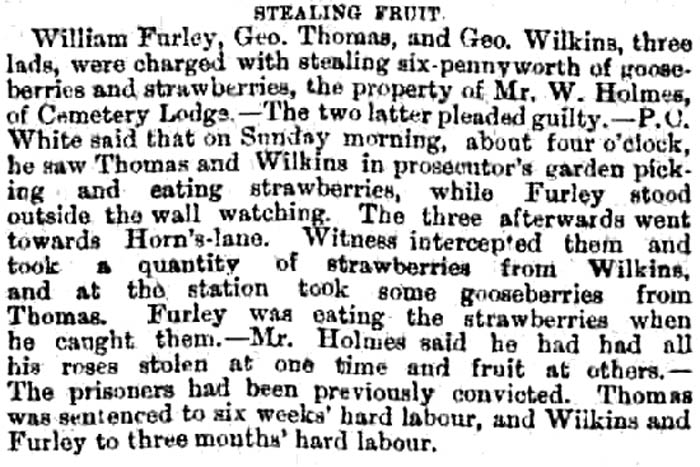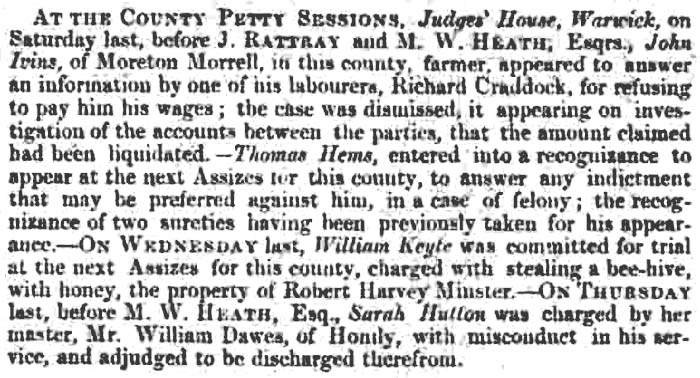Researching British press coverage between 1750 and 1950.
Unlock Your UK Family History: Discover Newspaper Stories from 1750 to 1950
Welcome to my free service designed to simplify your journey through UK family history and British historical events. I specialise in searching, fact-checking, and revealing authentic news stories from the years 1750 to 1950. Whether you’re seeking minor details or monumental tales about your ancestors, I’m here to assist you every step of the way tracking British Death Sentences and criminals.
How It Works:
News Article Searches: I meticulously scour historical news articles for mentions of your ancestors. Whether they were involved in a crime, witnessed an event, or were celebrated for their achievements, I aim to uncover their stories as reported at the time.
Free PDF Delivery: Upon discovering relevant news articles, I’ll compile them into PDF format and deliver them straight to your inbox, free of charge. My goal is to provide you with convenient access to valuable historical resources for your research.
Transparent Communication: If I’m unable to find any information about your ancestors, I’ll promptly inform you. Transparency is a core value, and I believe in keeping you informed throughout the research process.
Discover Your Ancestors’ Truths: Good or Bad, We’ve Got You Covered
Whether your ancestors’ stories are filled with triumphs or trials, my mission is to present you with documented truths from historical archives. Let me help you uncover the rich tapestry of your family’s past and the captivating history of Britain.
Start Your Journey Today: Explore Your Family’s Legacy with Old British News!
If I find any news articles I will attach them in PDF format by email. If I don’t find anything I will let you know as well.
This service and the supply of any relevant articles is completely free to use:
The form
How it works
If you suspect that your ancestor may have been involved in a court case, whether accused of a crime, witnessed, a victim, deported, imprisoned, or acquitted, I can potentially unveil the news as it was reported at that time. This free to use service (covering the period 1750 – 1950) aims to assist individuals interested in their UK family history or British history in general. If any information is unearthed from the archives, you will be promptly notified. Similarly, if no relevant findings are obtained, you will be informed accordingly.
About British death sentences
Information about British criminals sentenced to death during the 17th, 18th, 19th and part of 20th centuries, including the types of crimes they committed, those who were transported, and those who were executed.
During this time period, the British legal system was quite harsh, and a wide range of crimes were punishable by death. These included offenses such as murder, rape, highway robbery, treason, forgery, arson, and even smaller offenses like theft of items worth a certain value. The law was often rigid and unforgiving, with little consideration for the individual circumstances of the accused.
Criminals sentenced to death faced various methods of execution, including hanging, which was the most common method. In some cases, particularly heinous crimes, individuals could also be subjected to more gruesome forms of execution, such as drawing and quartering for those convicted of high treason. This involved hanging, disembowelment, and dismemberment of the body. However, over time, public sentiment began to turn against these brutal practices, and efforts to reform the criminal justice system emerged.
Transportation was another significant aspect of dealing with criminals during this time. Instead of execution, some individuals convicted of lesser offenses were sentenced to transportation to British colonies, especially in Australia. They were often sent away for a specified period, such as seven or fourteen years, to serve as labourers in these colonies. This practice aimed to alleviate overcrowded prisons in Britain and establish a workforce in the colonies.
The 19th century witnessed significant reforms in the legal system and a move towards more humane approaches to criminal justice. As public sentiment shifted, there was a growing recognition that not all crimes warranted the death penalty. Reforms in the mid-19th century led to a reduction in the number of offenses punishable by death and a shift towards imprisonment as the primary form of punishment.
In summary, during the 17th, 18th, and 19th centuries, British criminals faced the death penalty for a wide range of offenses, including murder, rape, robbery, and more. Methods of execution varied, with hanging being the most common. Transportation to overseas colonies provided an alternative punishment for some offenders. Over time, changing attitudes and legal reforms led to a more nuanced approach to criminal justice, ultimately reducing the number of crimes punishable by death and moving towards imprisonment as a primary form of punishment.
About me
I really enjoy British history. I love learning about it, discovering hidden parts, writing about it, and even being on the news, radio, and TV to talk about it. I am driven to shed light on these accounts and set the record straight. From quaint village garden competitions to gripping tales of crime, scandal, and life-altering events, I am fascinated by what our ancestors did and how their actions have shaped who we are today. Every single fact, regardless of its size, holds the potential to be unearthed and brought into the light (more here).
Why old newspapers?
- Life events data, such as birth, marriage and death notices are the basics for family history.
- Local news can provide a lot of detail, especially about relationships and residence of various family members. This sometimes picks up lost links or branches of a family who stayed or moved. It may also account for a youngster who was born and died between census enumerations.
- Many snippets of information are buried in the advertisements and legal notices.
- Marriages, death notices and other short items
- Notices of sale of land, bankruptcy, dissolutions of partnership which could give clues to a change of financial status.
What can you expect to find in newspapers?
- Crime reports
- Obituaries
- Birth, marriage, death and funeral notices
- Announcements of life events
- Social news
- Activities of clubs and organisations
- Workhouse reports
- Legal notices, such as those from court cases
- Police statements
- Local events and coverage
- Bankruptcies
- Advertisements and business notices
- Weather
- Major local events, such as fires and floods
- Shipping
 Illustrated Police News – Saturday 09 July 1892[/caption]
Illustrated Police News – Saturday 09 July 1892[/caption]
Searching my database
Use this Google form to search across my online network (Old British News and Murder Research):
For example




